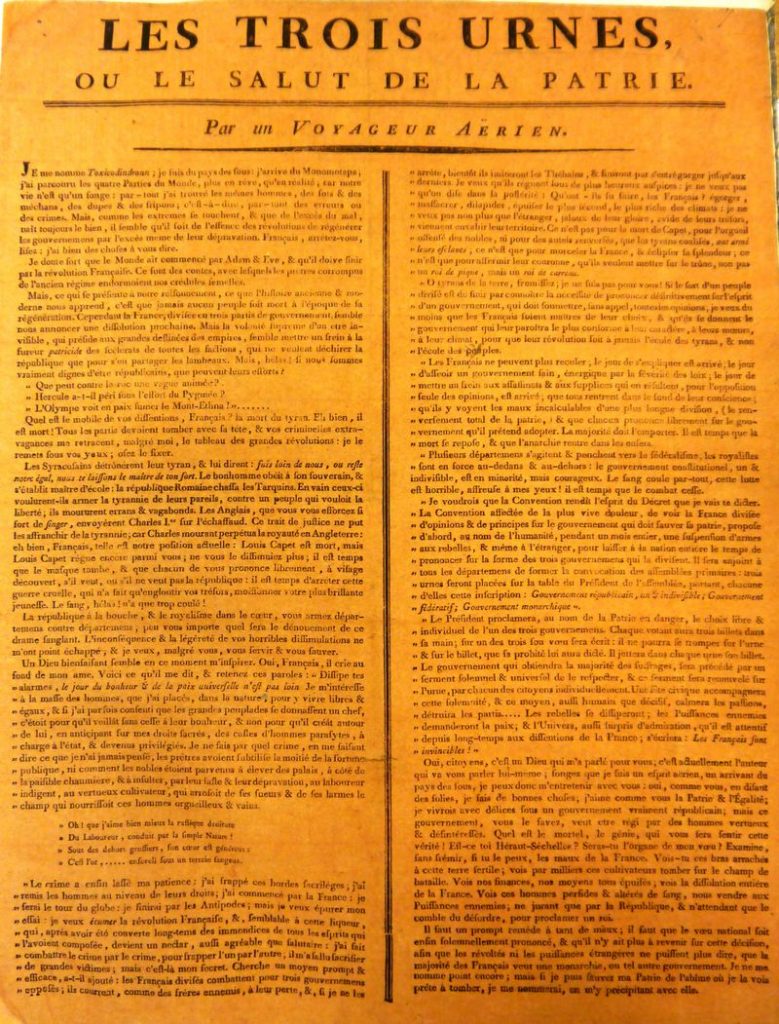 While the French revolution, and especially its Declaration of the Rights of Man, is often hailed as the birth of modern democracy, the actors of the revolution did not think of themselves as democrats. Political thought then was firmly republican, focused on whether the government acted for the common good, and not for that of its rulers. In fact, early republican proposals were for a constitutional monarchy – this stopped being an option when Louis Capet, previously Louis XVI, was tried and condemned to die at the guillotine in January 1793. But even then democracy was not obviously on the cards – the people were sovereign, they were expected to speak out and act, but not necessarily vote or choose their government.
While the French revolution, and especially its Declaration of the Rights of Man, is often hailed as the birth of modern democracy, the actors of the revolution did not think of themselves as democrats. Political thought then was firmly republican, focused on whether the government acted for the common good, and not for that of its rulers. In fact, early republican proposals were for a constitutional monarchy – this stopped being an option when Louis Capet, previously Louis XVI, was tried and condemned to die at the guillotine in January 1793. But even then democracy was not obviously on the cards – the people were sovereign, they were expected to speak out and act, but not necessarily vote or choose their government.
One writer who first voiced the view that the people of France should choose how they would be governed was Olympe de Gouges, playwright, philosopher, and social reformer.
She suggested that the people of France choose whether they wanted to be governed democratically or reinstate a (constitutional) monarchy. The third option was federal rule. The only way to save the Republic from the tyranny of Robespierre, she argued, would be to turn to a democratic practice: a vote. But what she anticipated, paradoxically, was that this vote might well result in the people choosing to revert to a constitutional monarchy.
Gouges’s Three Urns presages a thought about democracy that reflects what later thinkers have said about it, including Philip Pettit who noted this paradox in the theory of democratic government: a people may choose democratically to be ruled undemocratically:
“A society that makes decisions on a democratic basis, with everyone sharing equally in control of government, could in principle decide on a permanent renunciation of democratic rule, denying future generations the right to shape their institutions on an equally shared basis.” P. Pettit, On the People’s Terms, (2012, Cambridge University Press), p.25.
Gouges was not, by then, a monarchist, but she felt that the current government of France had been usurped by the Paris Commune, lead by Robespierre, Danton and Marat.
She also suspected that if the people were not ready to vote for a democratic government for themselves, they were probably not mature for it. Liberty, she thought, had to be earned, and this took time.
Liberty comes at a cost: independence. Independence, in turn, needs to be strengthened and nurtured by virtue. As Kant pointed out, five years before the Revolution started, acquiring the capacity to think for oneself takes work, and most people, left to themselves are more likely to fall back into lazy habits of letting themselves be guided by masters, clergy, or rulers. The creation of an independent nation will take time, Kant concludes:
[A] public can achieve enlightenment only slowly. A revolution may bring about the end of a personal despotism or of avaricious tyrannical oppression, but never a true reform of modes of thought. New prejudices will serve, in place of the old, as guide lines for the unthinking multitude. (An answer to the question what is Enlightenment)
Gouges, very much in agreement with Kant, decried the state of things in the early days of the Revolution, where newly-minted citizens, whom she called ‘democrats,’ were unable to live with the liberty they acquired. She also insisted, later in the Revolution, that any liberty gained would be lost without virtue, not only in the case of the people, but especially of the leaders.
Although she was as much of a republican as Robespierre, the suggestion that any kind of monarch be reinstated caused Gouges to be arrested.
As many did at the time Gouges published her pamphlets by having them pasted on the walls of Paris. Before publishing The Three Urns she sent a copy to the Committee of Public Safety, and one to Herault de Seychelle, responsible for the censorship of printed material. They did not object, so she assumed that she could go ahead and paste her pamphlet all over Paris.
The tract was printed by her usual printer, Longuet, on 15 July. He drew 1000 copies. Her distributor, or afficheur, was a Citizen Meunier, who lived and worked Rue de la Huchette, in the Latin Quarter.
On 20 July, Olympe left her apartment on the Ile de la Cité, crossed the St Michel bridge, and turned left into the Rue de la Huchette. Meunier said he could not do the pasting, as he worried that it would rain. One imagines Olympe looking up at the clear sky, puzzled, and then annoyed, before she set out to find another distributor on the Pont St Michel. But Meunier had her followed by his daughter and three members of the police. As soon as Olympe knocked at the door, Meunier’s daughter pointed her out to three policemen who arrested her and dragged her to the Depot prison of the City Hall. She was kept there in an isolated cell, ‘au secret’ for several days. On 28 July, she was taken to the Prison de l’Abbaye, then to two other prisons, and eventually to the Conciergerie, where she was tried by Fouquier-Tinville. On 3 November 1793, a rainy day, she was executed.
